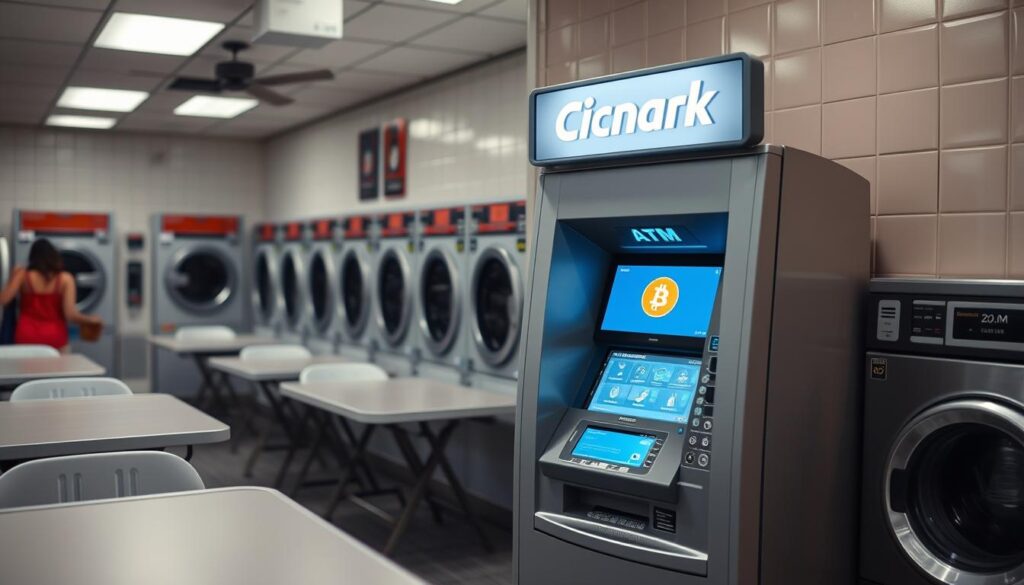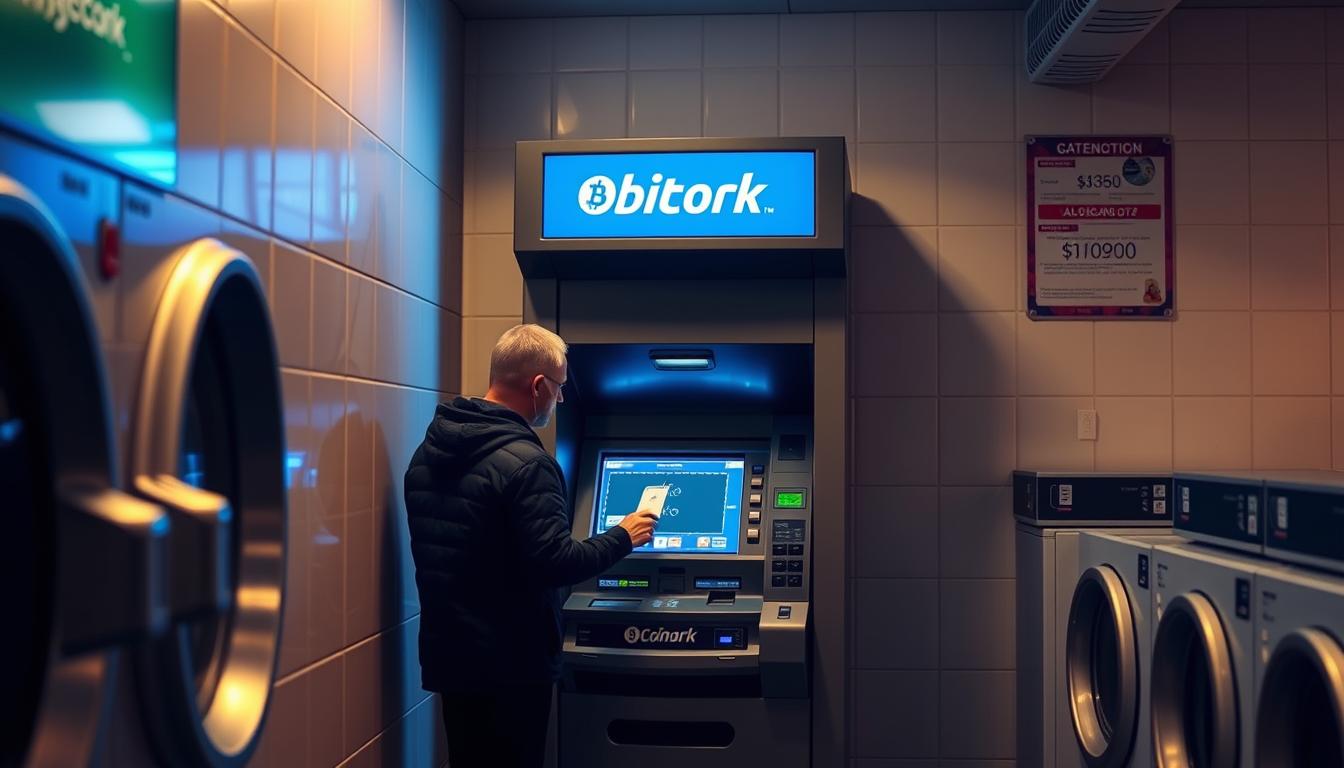Have you ever wondered how Bitcoin ATMs are changing the way we handle money in Erie, PA? The rise of these machines has brought both convenience and complexity. As of now, there are over 50 Bitcoin ATMs in Erie, marking a 400% increase since 2018. This growth is a double-edged sword, offering easy access to digital currency but also introducing a host of compliance and security challenges.
Imagine walking into a local convenience store and using a Bitcoin ATM like the one at Coinark. It seems simple, but each transaction involves a web of regulations. Understanding these challenges is crucial for anyone considering using these machines. In this article, we’ll explore the legal risks, compliance hurdles, and safety measures you need to know before your next transaction.
The surge in Bitcoin ATMs has made transactions more accessible, but it also means more complicated rules to follow. From money movement to machine security, every detail matters. Whether you’re new to Bitcoin or a seasoned user, this guide will help you navigate the evolving landscape of digital currency in Erie, PA.
Key Takeaways
- The number of Bitcoin ATMs in Erie, PA, has grown significantly, with over 50 machines now available.
- Using a Bitcoin ATM involves complex compliance and security measures that users must understand.
- Understanding local challenges is essential for anyone considering a Bitcoin transaction in Erie, PA.
- Each transaction comes with its own set of risks and regulatory requirements.
- Staying informed about legal risks and safety measures is crucial for secure Bitcoin ATM use.
Introduction to Bitcoin ATM Compliance in Erie, PA
Cryptocurrency adoption in Erie, PA, has grown significantly, with over 50 Bitcoin ATMs now available. This surge brings both convenience and compliance challenges. Coinark Bitcoin ATM at 3310 Buffalo Rd stands out as a reliable option, offering 24/7 access and quick transactions.
Overview of Cryptocurrency Trends in Erie
Local businesses are embracing digital currency, creating a crypto-friendly environment. However, this acceptance also introduces concerns about scams and fraud. Users must stay vigilant to avoid falling victim to fraudulent activities.
Coinark Bitcoin ATM as a Local Benchmark
Coinark, located at 3310 Buffalo Rd, is a prime example of seamless cash transactions. It supports up to $25,000 daily, making it a benchmark for reliability and accessibility. Such ATMs are crucial for both newcomers and experienced users, despite the associated risks.
| Feature | Details |
|---|---|
| Transaction Limit | Up to $25,000 daily |
| Operating Hours | 24/7 |
| Transaction Speed | Less than 3 minutes |
Local banks are adapting to support digital transactions, engaging with Bitcoin ATMs to meet customer needs. Despite regulatory challenges, businesses contribute to a growing crypto-acceptance atmosphere. Understanding these trends is key to assessing compliance and security issues.
Bitcoin ATM Legal Risks Erie, PA
Understanding the legal landscape is crucial when using Bitcoin via ATMs in Erie, PA. The way transactions are processed can expose users and operators to unforeseen legal challenges. Without clear guidelines, access to secure digital funds can become risky.
Primary legal risks include non-compliance with regulations, which can lead to severe penalties. Operators face challenges when users use a bitcoin atm without understanding the associated risks. Misinterpreting laws can result in unintended violations, highlighting the need for regulatory clarity.
Local incidents show how legal ambiguities have hindered ATM operations. Ensuring adherence to guidelines is essential to avoid complications. Staying informed about legal frameworks is vital for secure and compliant transactions.

- Insufficient regulatory adherence can lead to penalties.
- Transaction processing methods may expose legal gaps.
- Secure fund access requires clear legal frameworks.
- User awareness is crucial for operators.
- Regulatory clarity prevents legal missteps.
Compliance and Regulatory Challenges
Navigating the complex world of compliance and regulations is essential for anyone involved with digital currency transactions. Understanding these challenges helps users and operators alike ensure secure and legal interactions.
AML and KYC Considerations for ATMs
Anti-Money Laundering (AML) and Know Your Customer (KYC) regulations are crucial for preventing illicit activities. These protocols require users to verify their identities, ensuring that transactions remain transparent and legal. However, scammers often target these systems, making robust security measures essential.
Local Government and Legal Obstacles
Local governments in Erie, PA, have introduced specific regulations that complicate operations. Operators must adhere to these rules to avoid penalties, which can include hefty fines. For instance, large withdrawals require additional scrutiny, potentially delaying transactions and increasing operational costs.
| Challenge | Description |
|---|---|
| AML Compliance | Requires user identity verification to prevent money laundering. |
| KYC Protocols | Ensures customers are who they claim to be to prevent fraud. |
| Scammer Threats | Fraudulent activities targeting users through phishing emails and fake transactions. |
| Large Withdrawals | Higher scrutiny and potential delays for significant transactions. |
| Rapid Transactions | Balancing speed with security measures to prevent fraud. |
In conclusion, staying informed about AML, KYC, and local regulations is crucial for secure and compliant transactions. By understanding these challenges, users can better navigate the evolving landscape of digital currency in Erie, PA.
User Experience and Security Concerns
When using digital currency services, security is a top priority. Understanding how to protect yourself from scams and fraud is essential for a safe experience. This section will guide you through recognizing scam tactics and enhancing the security of your transactions.
Recognizing Scam Tactics and Fraud Alerts
Scammers often target users with deceptive messages designed to trigger urgent actions. Phishing emails and fake alerts are common tactics used to steal sensitive information. Always verify the source of any message before taking action. For example, if you receive an urgent message about your account, contact the provider directly through official channels to confirm its legitimacy.
A key step in avoiding fraud is scrutinizing every message or alert. Never share personal details or wallet information in response to unsolicited requests. Be cautious of messages that create a sense of urgency, as this is a common trick to pressure you into making hasty decisions.
Enhancing Digital Wallet and Transaction Security
To protect your assets, consider implementing additional security measures. Use strong, unique passwords and enable two-factor authentication (2FA) for your digital wallet. Regularly update your software and apps to ensure you have the latest security features.
Understanding the number of potential vulnerabilities in ATM interfaces can help you take proactive steps. Educating yourself about these risks and how to mitigate them is crucial for secure transactions. By staying informed and vigilant, you can significantly reduce the likelihood of falling victim to fraud.

In conclusion, enhancing your digital wallet’s security and recognizing scam tactics are vital for a safe and secure experience. By following these tips, you can better protect yourself and your assets when using digital currency services.
Balancing Transaction Fees and Accessibility
When it comes to using digital currency services, understanding the balance between transaction fees and accessibility is key. High fees can deter users, while easy access is essential for adoption. Let’s explore how these factors interact in Erie, PA.
Impact of Fees on User Adoption
Fee structures significantly influence how people use these services. In Erie, fees range from 8% to 24%, with an average of 16%. Lower fees can boost transaction frequency, making the service more appealing to a broader audience.
- Higher fees may reduce usage, especially for smaller transactions.
- Transparent fee schedules build user confidence and trust.
- Data shows that lower fees correlate with higher transaction volumes.
Geographical Distribution and Accessibility Insights
The location of these machines plays a crucial role. Urban areas offer more convenience, while suburban areas may have fewer options, affecting accessibility for some residents. Strategic placement in busy areas can enhance user experience and adoption rates.
| Location Type | Accessibility Features |
|---|---|
| Urban | Higher concentration, easier access |
| Suburban | Less availability, longer travel times |
Local government policies and laws also shape fee structures and accessibility. Ensuring a balance between these factors is essential for fostering a crypto-friendly environment in Erie, PA.
Conclusion
In conclusion, the growth of digital currency services in Erie, PA, has brought both convenience and complexity. As the number of these machines increases, so do the legal and regulatory challenges that users and operators must navigate. Protecting your personal information is more important than ever, and being cautious of fraudulent texts or emails can help prevent scams.
One key tip is to always verify the legitimacy of any message before taking action. If you receive an urgent alert, contact the service provider directly through official channels. Additionally, ensuring that bank financial practices align with regulatory standards is crucial for maintaining trust and security in these transactions.
By staying informed and following practical tips, such as enabling two-factor authentication and avoiding hasty actions, you can enhance the security of your transactions. Remember, vigilance and education are essential in this evolving digital landscape. Stay proactive and well-informed to ensure a safe and secure experience.
FAQ
How can I protect myself from scams when using a Bitcoin ATM?
What should I do if I receive a suspicious email or message about my transaction?
How can I safely withdraw cash using a Bitcoin ATM?
What are the common signs of a fraudulent Bitcoin ATM?
Can I trust all Bitcoin ATMs with my financial information?
How do I report a fraudulent transaction?
Are Bitcoin ATMs regulated by government agencies?
How can I avoid falling victim to phishing scams related to Bitcoin ATMs?
What should I do if I suspect my Bitcoin ATM transaction was fraudulent?
How can I stay updated on the latest security alerts and fraud warnings?
Source Links
- https://www.dfs.ny.gov/reports-and-publications/dfs-annual-reports/cpfed-annualrep-2024 – NYSDFS: 2024 CPFED Annual Report
- https://repository.uclawsf.edu/cgi/viewcontent.cgi?article=1073&context=hastings_law_journal – Apple Pay, Bitcoin, and Consumers: The ABCs of Future Public Payments Law
- https://www.prnewswire.com/news-releases/erie-indemnity-approves-management-fee-rate-and-dividend-increase-declares-regular-dividends-302330726.html – Erie Indemnity Approves Management Fee Rate and Dividend Increase, Declares Regular Dividends
- https://trycoinark.com/cryptocurrency-atm-regulations-erie-pa/ – Cryptocurrency ATM regulations – Erie, PA
- https://trycoinark.com/protecting-bitcoin-atm-users-erie-pa/ – Protecting Bitcoin ATM users – Erie, PA

